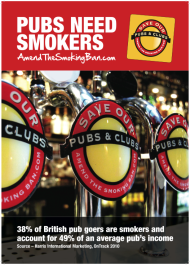 A week or so ago I mentioned that I had been sent a series of questions for an article about the impact of the smoking ban. I then invited your response to the same questions (see HERE). For what it's worth, here are my replies:
A week or so ago I mentioned that I had been sent a series of questions for an article about the impact of the smoking ban. I then invited your response to the same questions (see HERE). For what it's worth, here are my replies:
1. How would you say smokers have reacted to the smoking ban? Do you feel that people have been encouraged to give up?
Most smokers have adapted to the ban, just as they adapted to earlier restrictions on smoking. Some have reacted with good humour, but others are very unhappy about it. They are angry that the government reneged on its election promise to exempt private clubs and pubs that don't serve food, and they rightly believe that the ban is based on unfounded claims about the effects of passive smoking.
The inconvenience of having to go outside, especially at work, may have forced some people to cut down or quit, but the vast majority of smokers have no intention of giving up. If anything, the ban has reinforced their determination to smoke because no-one likes being told what to do. In the words of one smoker, they are "reaching for their fags in defiance".
2. A number of pubs and clubs have spent a lot of money converting their establishments to provide outdoor smoking areas. Many of these include outdoor heating which it could be suggested might have an environmental impact. What would your comment on this be?
This is the latest in a long line of scare-mongering tactics used by environmentalists and anti-smoking campaigners. If there is an impact it is probably very small and if people are worried about it there's a very easy solution - amend the legislation to allow pubs and clubs to create well-ventilated smoking rooms indoors so people don't have to go outside to smoke.
3. Interviews I have conducted for my article have suggested that smoking has become more of a social activity since the ban. Going out for a cigarette has become part of a night out for people. Do you think smoking has become more socially acceptable since the ban?
Smoking has always been a sociable activity and the ban hasn't changed that. However, being forced to go outside has probably heightened the sense of cameraderie among smokers. But no-one wants to go outside to smoke if it's cold and wet and for many people it's a real pain in the neck.
If, however, the ban is designed to "denormalise" smoking it's counter-productive because the sight of large numbers of smokers outside pubs and clubs simply emphasises how many people smoke and how normal it is for those who do.
4. Some smokers I have spoken to have suggested that going for a cigarette has become a way to meet new people. Approaching someone to ask for a lighter etc can be a great way to strike up a conversation. What would your comment on ‘smirting’ (smoking and flirting) be?
Smirting is nothing new. Smokers have always asked one another for a light and used it as an excuse to talk to someone they fancy. However, the ban does give people something to talk about so, until the novelty wears off, it's probably a good icebreaker for some people.
5. It could be suggested that non-smokers are encouraged to join their friends for a cigarette outside rather than be left alone in the pub/club. Do you think non-smokers will be encouraged to take up smoking as a social activity?
It's true that, rather than sit in an empty pub, non-smokers will often choose join their friends outside, but the idea that non-smokers will be encouraged to start smoking is crazy. There are lots of reasons why people choose to smoke, and this isn't one of them.
6. As far as passive smoking is concerned, are people less likely to receive the harmful effects by standing in close proximity to a smoker outside than inside?
The effects of passive smoking have been greatly exaggerated. Based on the evidence, there is no justification for a total ban on smoking in every pub, club and bar in the country. Given that the results of indoor studies are inconclusive, the suggestion that anyone is at risk from standing in close proximity to someone smoking outside is ludicrous. Some highly sensitive people may not like it, but there is not a shred of evidence to suggest that it is harmful. If campaigners use this as an excuse to ban smoking in outdoor areas as well they will open themselves to ridicule.
 Wednesday, December 19, 2007
Wednesday, December 19, 2007  I shall be in London tomorrow recording a 20-second soundbite for BBC Breakfast to be broadcast after Christmas. To be specific, they want to film in the car park at Sainsbury's, Ladbroke Grove, at 9.00am. No doubt it will be very, very cold.
I shall be in London tomorrow recording a 20-second soundbite for BBC Breakfast to be broadcast after Christmas. To be specific, they want to film in the car park at Sainsbury's, Ladbroke Grove, at 9.00am. No doubt it will be very, very cold. TV and Radio
TV and Radio 





















